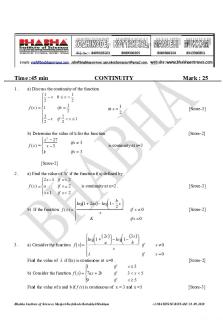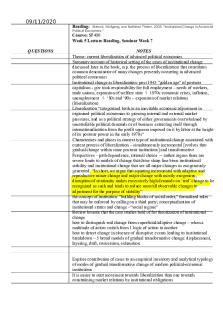W5 Reading - Beyond Continuity - Streeck, Wolfgang, and Kathleen Thelen. 2005 . Institutional Change in Advanced Political Economies PDF

| Title | W5 Reading - Beyond Continuity - Streeck, Wolfgang, and Kathleen Thelen. 2005 . Institutional Change in Advanced Political Economies |
|---|---|
| Course | International Social and Public Policy |
| Institution | The London School of Economics and Political Science |
| Pages | 2 |
| File Size | 194.3 KB |
| File Type | |
| Total Downloads | 15 |
| Total Views | 138 |
Summary
SP400 social policy...
Description
09/11/2020 Reading:
Streeck, Wolfgang, and Kathleen Thelen. 2005. "Institutional Change in Advanced Political Economies,"
Course: SP400 Week 5 Lecture Reading, Seminar Week 7 QUESTIONS
NOTES Theme: current liberalization of advanced political economies Summary account of historical setting of the cases of institutional change discussed later in the book, esp. the process of liberalization that constitutes common denominator of many changes presently occurring in advanced political economies Institutional change as liberalization: post 1945 “golden age” of postwar capitalism - gov took responsibility for full employment – needs of workers, trade unions, expansion of welfare state 1970s economic crises, inflation, unemployment ‘80s and ‘90s – expansion of market relations (liberalization) Liberalization “categorized both as an inevitable economic adjustment in organized political economies to growing internal and external market pressures, and as a political strategy of either governments overwhelmed by unsatisfiable political demands or of business extracting itself through internationalization from the profit squeeze imposed on it by labor at the height of its postwar power in the early 1970s” Characterizes and places in context type of institutional change associated with current process of liberalization – simultaneously incremental [evolves thro gradual change within same postwar institutions] and transformative Perspectives – path dependence, rational choice -- author argues there are severe limits to models of change that draw sharp line btwn institutional stability and institutional change that see all major changes as exogenously generated. “In short, we argue that equating incremental with adaptive and reproductive minor change and major change with mostly exogenous, disruption of continuity makes excessively high demands on ‘real’ change to be recognized as such and tends to reduce most/all observable changes to adjustment for the purpose of stability” the concept of institution: “building blocks of social order,” formalized rules that may be enforced by calling on a third party; conceptualization of institutional statics and change –“social regime” Review lessons that the case studies hold of for theorization of institutional change how to distinguish real change from superficial/adaptive change – when a multitude of actors switch from 1 logic of action to another how to detect change in absence of disruptive events leading to institutional breakdown – 5 broad models of gradual transformative change: displacement, layering, drift, conversion, exhaustion
Explore contribution of cases to an empirical inventory and analytical typology of modes of gradual transformative change of modern political-economic institutions It is easier to start movement towards liberalization than one towards constraining market relations by institutional obligations
SUMMARY:...
Similar Free PDFs

CONTINUITY IN ADVERTISING
- 10 Pages

Continuity
- 2 Pages

ADM2015 TN2 Mamourou Kathleen
- 5 Pages

14.2 Limits And Continuity
- 4 Pages

Continuity and Differentiation
- 2 Pages
Popular Institutions
- Tinajero National High School - Annex
- Politeknik Caltex Riau
- Yokohama City University
- SGT University
- University of Al-Qadisiyah
- Divine Word College of Vigan
- Techniek College Rotterdam
- Universidade de Santiago
- Universiti Teknologi MARA Cawangan Johor Kampus Pasir Gudang
- Poltekkes Kemenkes Yogyakarta
- Baguio City National High School
- Colegio san marcos
- preparatoria uno
- Centro de Bachillerato Tecnológico Industrial y de Servicios No. 107
- Dalian Maritime University
- Quang Trung Secondary School
- Colegio Tecnológico en Informática
- Corporación Regional de Educación Superior
- Grupo CEDVA
- Dar Al Uloom University
- Centro de Estudios Preuniversitarios de la Universidad Nacional de Ingeniería
- 上智大学
- Aakash International School, Nuna Majara
- San Felipe Neri Catholic School
- Kang Chiao International School - New Taipei City
- Misamis Occidental National High School
- Institución Educativa Escuela Normal Juan Ladrilleros
- Kolehiyo ng Pantukan
- Batanes State College
- Instituto Continental
- Sekolah Menengah Kejuruan Kesehatan Kaltara (Tarakan)
- Colegio de La Inmaculada Concepcion - Cebu










